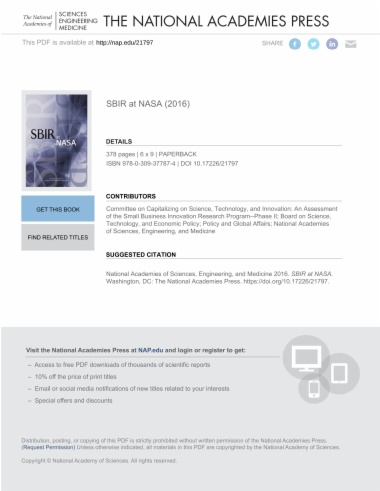

The Small Business Innovation Research (SBIR) program is one of the largest examples of U.S. public-private partnerships, and was established in 1982 to encourage small businesses to develop new processes and products and to provide quality research in support of the U.S. government's many missions. The U.S. Congress tasked the National Research Council with undertaking a comprehensive study of how the SBIR program has stimulated technological innovation and used small businesses to meet federal research and development needs, and with recommending further improvements to the program. In the first round of this study, an ad hoc committee prepared a series of reports from 2004 to 2009 on the SBIR program at the five agencies responsible for 96 percent of the program's operations—including NASA. In a follow-up to the first round, NASA requested from the Academies an assessment focused on operational questions in order to identify further improvements to the program.
Public-private partnerships like SBIR are particularly important since today's knowledge economy is driven in large part by the nation's capacity to innovate. One of the defining features of the U.S. economy is a high level of entrepreneurial activity. Entrepreneurs in the United States see opportunities and are willing and able to assume risk to bring new welfare-enhancing, wealth-generating technologies to the market. Yet, although discoveries in various fields present new opportunities, converting these discoveries into innovations for the market involves substantial challenges. The American capacity for innovation can be strengthened by addressing the challenges faced by entrepreneurs.